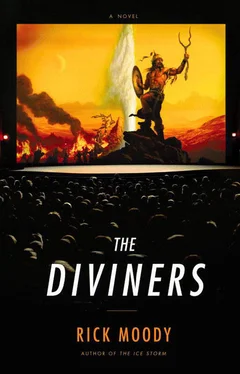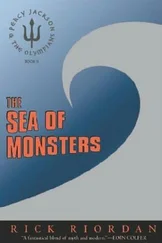“I do not have time to help.”
“No, I’m supposed to help you, ” Jeanine says. She looks down the hall to where Annabel is typing. Annabel won’t meet her eyes. Annabel is pretending that the exchange is not being overheard because Annabel only really cares about her screenplay and about getting a production credit somehow. Every indie guy that comes into Means of Production, even if he hasn’t showered in five days and has needle tracks, Annabel is all over him, covering this guy with friendly caresses, giving lots of tips about submitting his work, asking him if she can get him a cup of coffee. Call any time, please.
Ranjeet laughs like a maniac. “Just making sport with you. Of course. Please do come in.” There is only the desk and chair. And it’s dark. On the north side, were Ranjeet to look out the window, he could see the skaters on their way around the rink. He could see the statue of Prometheus, firebringer. In a couple of weeks, the Christmas tree. There’s a guy whose job it is to go around the country, in a subcompact, looking for just the right tree. He stops at diners along the country roads. He gets a feel for the region. There must be some intuitive, magical understanding to the task. Hello, ma’am, would it be possible to take down the tree in your yard? You will be handsomely paid.
Coverage all over the floor. Pages and pages of the stuff. Spilled everywhere, like a gale has swept through. She picks up a crumpled leaf. It says MM on it, which means it’s Madison’s. Adaptation of a novel by Marie Callahan concerning Napoleon’s exile to St. Helena and a relationship he had with a stunning island lass. The lass is obsessed with prisms and lenses. She convinces Napoleon that prisms have a military application. Madison’s final comment:
Not really clear what prisms have to do with Napoleon, but they’re a filmic device that, in the right hands, could be beautiful to look at. The second act, in which Elsa betrays Napoleon by signaling (with mirrors) to a British frigate about his plans for a return to France, is heartbreaking and surprising, especially since she’s pregnant with his child. Too bad the story falls apart after that.
Ranjeet is reading it over her shoulder.
“I don’t know what I am meant to do with these,” he says.
“Sometimes you can find some good ones.”
She sweeps up a half dozen pages from the floor. Genre: sci-fi/ exploitation. Budget: one hundred million. Setting: Alpha Centauri. Reader: TG.
“Sometimes finished scripts get submitted, especially to Thaddeus. We like to read his coverage.”
The disembodied robot heads go to war against one another because each group suspects that another is guilty of passing secrets to the human slave population. Technology has given the robots the faults of small-town folks. Like envy and small-mindedness. Unfortunately, the dialogue resembles an interview with an East German shot-put expert. I’d rather develop a romantic comedy about dog walkers.
“Dog walkers?”
“You know, the people who are hired to walk other people’s dogs?”
The Indian guy is staring deeply into her eyes, as though he read about this strategy in a manual about the business. She’s tired. She has a lot of work to do. There’s something more that she should be doing, and that’s why she still has this job. There’s always more to do, and there’s always something she has done wrong. Vanessa is pissed, for example, because Jeanine wouldn’t eat any of the doughnuts. And she messed up the thing with Kinesthesia Productions, where she was supposed to deliver a script at exactly five o’clock because if the script got there before five o’clock, then one of the embittered assistants at Kinesthesia would pass on it. They pass on everything. But if it got there right at five o’clock, then it would go to Biedermeier’s country house in Rhinebeck with him. The embittered twenty-four-year-olds wouldn’t have a chance to pass on it. Vanessa has threatened to fire her three times this week. And the Indian guy is looking at her in this way like he feels compassion about all of this and yet still wants to touch her ass.
He says, “Would you like to sit on the desk, please?”
“On the desk?”
“I am going to explain something about television. Which is why I am here. I am a person who understands this medium. I learned this in my country. I’m the teacher of the meaning of television in the West. Or, to put it another way: I am the guru of television. I intend now to begin explaining.”
Afternoon light dances on the wall. Outside in the world all these people are in a frenzy about chads. Hanging. Perforated. The Indian guy doesn’t know what a chad is and doesn’t care. The Indian guy can’t vote. Jeanine didn’t vote because she didn’t have time. She was scouring the soap scum out of the corners of her shower at home yesterday because it made her feel better about things. It’s her parents’ apartment, for occasions when they visit NYC, and it needs to be spotless. Her roommate keeps inviting her out for things. She won’t meet anyone if she’s always at the office or ridding the bathroom of soap scum. But she doesn’t need to meet anyone when there is an action film star who tells her that she has great tits and begs her to let him please forgo the use of a condom.
Ranjeet has her by the hand. He holds her wrist as if it were spun glass. He leads her to the desk. Helps her up onto the edge of the desk. He says, in his accent, which has the honeyed syllables of a superior subcontinental education, that first of all there were cave paintings. The cave paintings were petroglyphs left behind for men to indicate that other men had once trod on this spot. And here were the things that these men saw. They saw that there were animals, they saw that there were tigers and mammoths and hyenas, and these were the petroglyphs that were left behind preserving the glories of the hunt. History so loves the petroglyph that it never vanishes from human image-making: how to capture a hyena, how to chase down a mammoth, large game slain on the veldt. Then there are the hieroglyphs, these come next, and of the hieroglyphs we know that there are pictures of men fighting against other men, that the northern tribes fought against the southern tribes, and then each of these in turn fought with the eastern and western tribes. We know how these tribes danced and how they loved, we know all these things from these pictures, these hieroglyphs. And now there is the knowledge of the petroglyphs, Ranjeet says, and the knowledge of the hieroglyphs. Every baby that is born is born with the knowledge preserved in these pictures. At the same time, however, there was a mistake which was the mistake of the alphabet — not a picture at all, but rather an emblem for certain kinds of grunts and moans that are made by men. All is made wrong by the historical turn toward the alphabet. All is disturbed by the alphabet. With the calligraphies of the Qur’an and its Arabic tongues, there are letters and sounds of beauty; they are almost like pictures for men to look at. These are of the surpassing beauty that we associate with the pictograms of the Asian tongues. Pictograms were beautiful, and the writers wrote of cranes and bears in the forest and the archers hunting down the bears. The beauty of these pictograms created in the minds of men in China and Japan and Korea ten thousand inventions. They left behind their pictorial account of the noodle, and this learning was transmitted to the men and women who came after and who carried with them the pictures from before, the petroglyphs, the hieroglyphs, the erotic pictures painted on Greek urns, all these were contained in the pictures of the painters, the painters who introduced perspective into the world of flat drawings, the painters of cathedral ceilings, with their lenses and prisms. Then, when the time was right, these painters spawned the photograph; the photograph sprang from the obsessions of cathedral painters, you see, and the photograph was good. These photographs used the very same techniques favored by the painters of petroglyphs. Photographs of untouchables lining the streets of the city, photographs taken by imperialists, these indicate that everything is possible now, and any one man or woman may be an artist of vision, and everyone can remember the history of his city, his culture, his nation, and it is the same with the magic of cinema, where now pictures and music and stories and paintings are all made one, in this special Platonic cave; the greater the audience, the larger the audience, the more memorable the stories, better even than photographs, better even than cathedral paintings. Meanwhile, somewhere else, somewhere far distant but adjacent, there is a different story being told: the tale of written words, words on the page in alphabets. This tale is a sickness. A beautiful sickness, a way of specialized meanings that must be interpreted by monks in little cells with bars on the windows, arguing about this and that, what does this word mean, this word means that you must not eat chickens on Sunday, and this word means that if no one hears, a tree has not fallen. This is a beautiful sickness, a beautiful splitting in half of hairs, and many millions of people in cold northern regions fall ill with it, as with the illness known as plague. This is not the true way because these tales of the alphabet have no light in them. These tales are produced in dank chambers where a large ugly machine goes around and around, smudging grease on pulped boards that are preserved by monks with failing eyesight. No, as you can now see, the true way must be the way of bringing light to all the people, and there is but the one way to do that. There is the one way that cinema becomes the gift to all people of all learning and all teaching, and all beauty, and all truth, the preserved history of all mankind. There is but one way. And, furthermore, that way is the way of the little box that comes into your home or your airport waiting room or your hospital room. That way is the way of television, which is the one light, the light in the house, the light in the darkness, the light of the satellite dish, the light of the dishwallahs of India, the light of the rural places coming out of the darkness, the light of television that brings together all men and women in red bathing suits on a shore, the light of a talking horse, the light of a red-haired woman and her bandleader husband when they argue and she crosses her eyes, the light of an army hospital and its surgeons during the war, the light of a special team of policewomen who are like the three seductive fates, the light of unshaven policemen from a city in Florida, the light of a family of oil barons, the light of four women who sleep with many men and talk about it in cafés, the light of all persons who wish to be millionaires. This is the true story of men and women of today. This is where the myths and stories for the future must be sown. This is where all that needs to be told is told about the heroism of great wrestlers and beautiful women. This is where the stories are told about the houses of rich people and about the plastic surgery transformations of these people into gods. The stories are not told in the consumptive sickness of literature, of words on a page. That is for people who are dying and are sick and nauseated and are vomiting up all their hatred. You can see them dying, inch by inch, because they are homosexuals and are having sex with devices, which is pleasurable, which passes the time, but it is not the way that is delighted in by the gods. This film that you are going to make now, it must be the way of light and the aesthetic vision, it must be television, with its scantily clad sirens, and not in the movie theater that sells cappuccino instead of candies and popcorn. That is what I have been brought here to tell you, Ranjeet intones.
Читать дальше












